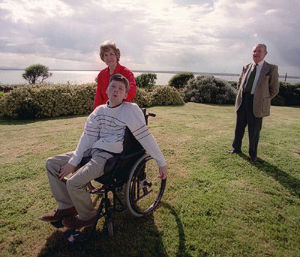
I had never heard of him until he died. The Economist ran this obituary, and I’d encourage you to take a moment to read it.
Christopher Nolan was not just a writer. He was a maestro attuned to the melody of language. But, unable to speak due to a crushing case of cerebral palsy, the only instrument he was able to master was a stick taped to his forehead enabling him to poke out a word here and there on a custom keyboard. Sometimes it went as slowly as just a few words an hour, and that with the help of nerve-spasm dampening drugs and braces and lifelong love from selfless parents.
There are times when the efforts of the disabled, the downtrodden, and the otherwise less-advantaged are rewarded because they show stamina and strength despite the odds. Every parent knows this first-hand as we praise our children’s attempts to create and learn. Life is full of sliding scales and context counts; there is nothing wrong with this. But Christopher Nolan is doubly unusual, and thus doubly tragic. There is the first tragedy of the diseased disruption of any afflicted life. And then there is the second tragedy of the many body-bound works that will never be published. The briliance trapped in his brain, unable to find a vessel to mark the words, could have filled volumes. His writing stands on its own. As the obituary pointed out, I wouldn’t want to be Christopher Nolan. But still, I think I’d give a lot write like that. I think.
